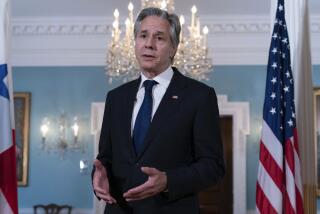N. Korea May Be Offered a Carrot
- Share via
WASHINGTON — The Bush administration might not object if other nations offer incentives to North Korea to abandon its nuclear weapons program, a senior State Department official said Friday.
The remarks, an apparent overture to South Korea, came as the United States prepared to join officials from Japan, South Korea, Russia, China and North Korea in Beijing on Wednesday for six-party talks aimed at persuading North Korea to dismantle its nuclear weapons program.
The United States tried but apparently failed to produce a joint U.S.-Japanese-South Korean position to present at the three-day session. Wary of the U.S. strategy of using military and economic pressure on North Korea to force it to disarm, South Korea has been taking a softer line toward its neighbor.
“Of the six parties, South Korea is probably the closest [in negotiating strategy] to North Korea,” said Georgetown University professor Victor D. Cha, calling Seoul’s position “very worrisome.”
“Whether they’ll even be on the same page as the other two allies, the U.S. and Japan, is a big question,” Cha said.
A second State Department official said that although South Korea might have more joint endeavors with North Korea than any other nation, Pyongyang is getting only a tiny portion of the economic help that it could expect from South Korea if it abandoned its nuclear program.
The U.S. wants North Korea to commit to the “complete, verifiable and irreversible ending of its nuclear arms program.” Doing so could open the door to “a very new kind of relationship” with the U.S. and other countries, the official said, including a possible normalization of relations, which have been frozen since the Korean War ended in a truce in 1953.
North Korea acknowledged having a secret uranium enrichment program last October, withdrew from the Nuclear Nonproliferation Treaty, announced that it had nuclear weapons -- and that it intended to make more.
The Bush administration has insisted that it will not give North Korea incentives to stop doing what it promised not to do in the first place. Both officials reiterated Friday that the U.S. is still determined not to offer incentives.
Assistant Secretary of State James A. Kelly, who is leading the U.S. delegation, is “not going with some package of rewards,” one official said.
North Korea has vowed not to give up what it claims is a necessary nuclear deterrent unless the United States drops its “hostile stance” toward Kim Jong Il’s regime and forswears any nuclear threat to Pyongyang. In a statement carried by the official news agency this week, it argued that “the Iraq war proved that consenting to disarmament through inspection does not help prevent a war but sparks it.”
President Bush has verbally pledged not to attack North Korea, but Pyongyang wants an official nonaggression pact, which Washington has ruled out.
North Korea has also demanded that the U.S. not hinder its economic development and that it normalize relations -- all as an apparent precondition to submitting its nuclear facilities to inspection.
Allowing a third country to sweeten any deal with North Korea before disarmament is completed could help break this diplomatic impasse.
The Bush administration would find some kinds of inducements troubling, but others could be seen as positive, the first State Department official told reporters, adding: “What’s an inducement is in the eye of the beholder.”
“We’re not telling the South Koreans to stop family exchanges or not to connect the railways [between South and North Korea] if those things contribute to the possibility of change in North Korea,” said the second official. “But we’re certainly not encouraging anyone to undertake new projects or benefits that would give the North Koreans solace in their discomfort.”
U.S. officials lowered expectations for the talks, saying it would be a positive step if the negotiations at least produced an agreement to meet again.
Analysts were even more pessimistic. Some said North Korea would never agree to give up its nuclear arsenal. Others said the Bush administration’s hard-line stance and well-publicized antipathy toward Kim would doom any deal.
More to Read
Sign up for Essential California
The most important California stories and recommendations in your inbox every morning.
You may occasionally receive promotional content from the Los Angeles Times.













